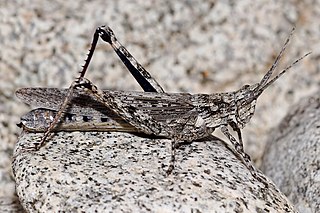
Acrididae are the predominant family of grasshoppers, comprising some 10,000 of the 11,000 species of the entire suborder Caelifera. The Acrididae are best known because all locusts are of the Acrididae. The subfamily Oedipodinae is sometimes classified as a distinct family Oedipodidae in the superfamily Acridoidea. Acrididae grasshoppers are characterized by relatively short and stout antennae, and tympana on the side of the first abdominal segment.

The grasshopper subfamily Acridinae, sometimes called silent slant-faced grasshoppers, belong of the large family Acrididae in the Orthoptera: Caelifera.
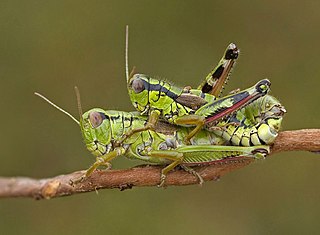
Acridoidea is the largest superfamily of grasshoppers in the order Orthoptera with over 11,000 species found on every continent except Antarctica.

Acrida is a genus of grasshoppers in the family Acrididae. The genus contains around 40 species which are found in Africa, Europe, Asia, North America, Hawaii, and Australia. Insects of this genus are omnivorous and a well-known pest of many agricultural crops.

The Trigonopterygoidea are an insect superfamily in the Orthoptera: Caelifera. Sometimes described as leaf grasshoppers, American species in the Xyronotidae have also been called razor-backed bush-hoppers.
Pamphagodidae is a small family of grasshoppers in the Orthoptera: suborder Caelifera. Species in this family can be found in southern Africa and Morocco.

Dericorythidae are a family of grasshoppers, in the Orthoptera: suborder Caelifera. Species in this family can be found in northern Africa, southern Europe and Asia.
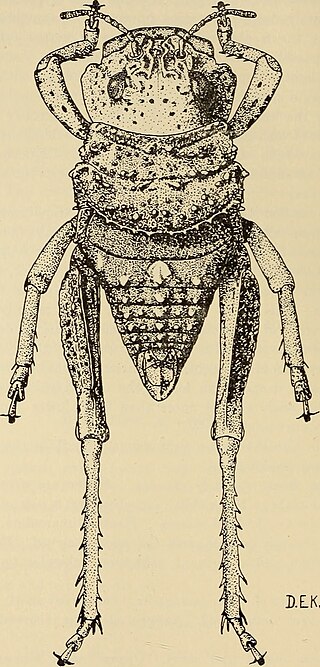
The Lathiceridae are a family of grasshoppers, in the Orthoptera: suborder Caelifera. Species in this family can be found in the desert regions of southern Africa where they resemble the stony ground on which they live. They are characterized by their apterous (wingless) bodies, which are dorsoventrally depressed and often excessively widened in the metathoracic region, giving them a spindle-like appearance. Their integument is sculptured and rugose, and their coloration varies from white to brown and purple, harmonizing with the color of the substratum on which they live.

The Lentulidae are a family of flightless grasshoppers found in sub-Saharan Africa.
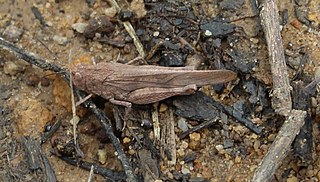
The Ommexechidae are a family of grasshoppers, in the Orthoptera: suborder Caelifera. Species in this family can be found in the Americas.
The Tristiridae are a family of grasshoppers, in the Orthoptera: suborder Caelifera. Species in this family can be found in the Americas.

The Trigonopterygidae are an insect family in the Orthoptera: Caelifera found in South Asia and Southeast Asia.

The Hemiacridinae are a subfamily of Acrididae in the Orthoptera: Caelifera. Species can be found in Africa and Asia.

Xenocatantops is a genus of grasshoppers in the subfamily Catantopinae and tribe Catantopini. Species can be found in Africa, India, China, Indo-China and Malesia.
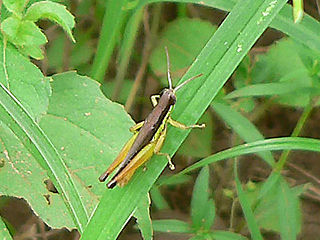
Spathosternum is a genus of grasshoppers in the family Acrididae: subfamily Spathosterninae, with species found in Africa, including Madagascar and tropical Asia.

Eyprepocnemis is a genus of grasshoppers in the subfamily Eyprepocnemidinae with species found in Africa, Southern Europe through to tropical Asia.

Stenocatantops is a genus of grasshoppers in the family Acrididae and subfamily Catantopinae. The recorded distribution of species includes: India, China, Indo-China and Malesia through to Australia.

Truxalis is a genus of grasshoppers in the family Acrididae, subfamily Acridinae and tribe Truxalini. Species can be found in: Africa, the Iberian peninsula, Asia minor through to Indo-China.
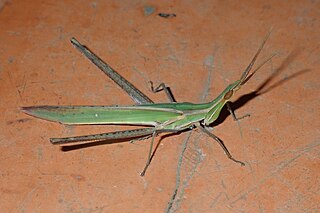
Acrida willemsei is an Asian species of grasshopper in the subfamily Acridinae. The recorded distribution of this species includes southern China, Taiwan, Indo-China, India and Malesia. It was first described in 1954.
Shirakiacris is an Asian genus of grasshoppers in the subfamily Eyprepocnemidinae and the tribe Eyprepocnemidini. Its recorded distribution includes: southern and eastern China, Korea, Japan and Vietnam.
















